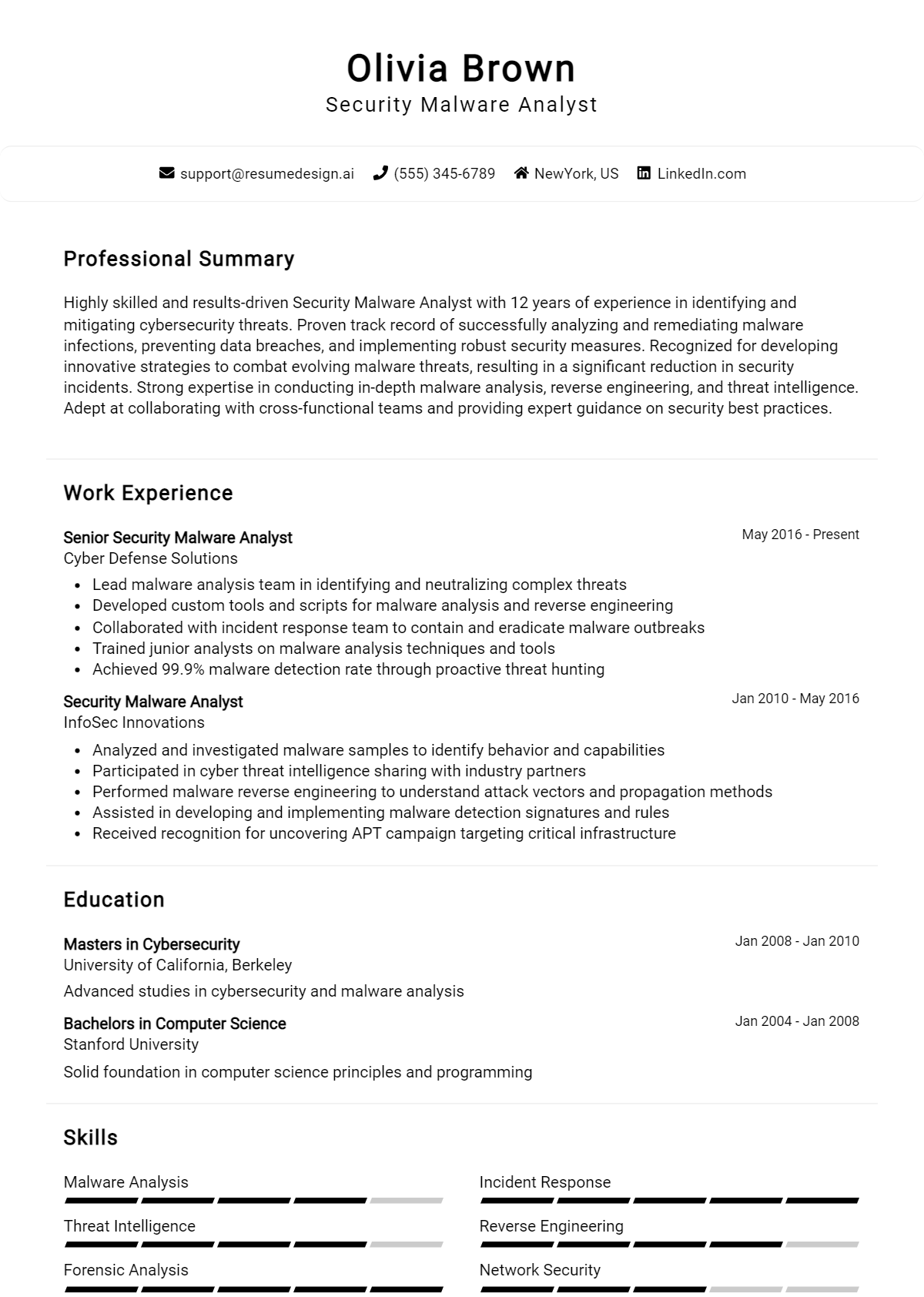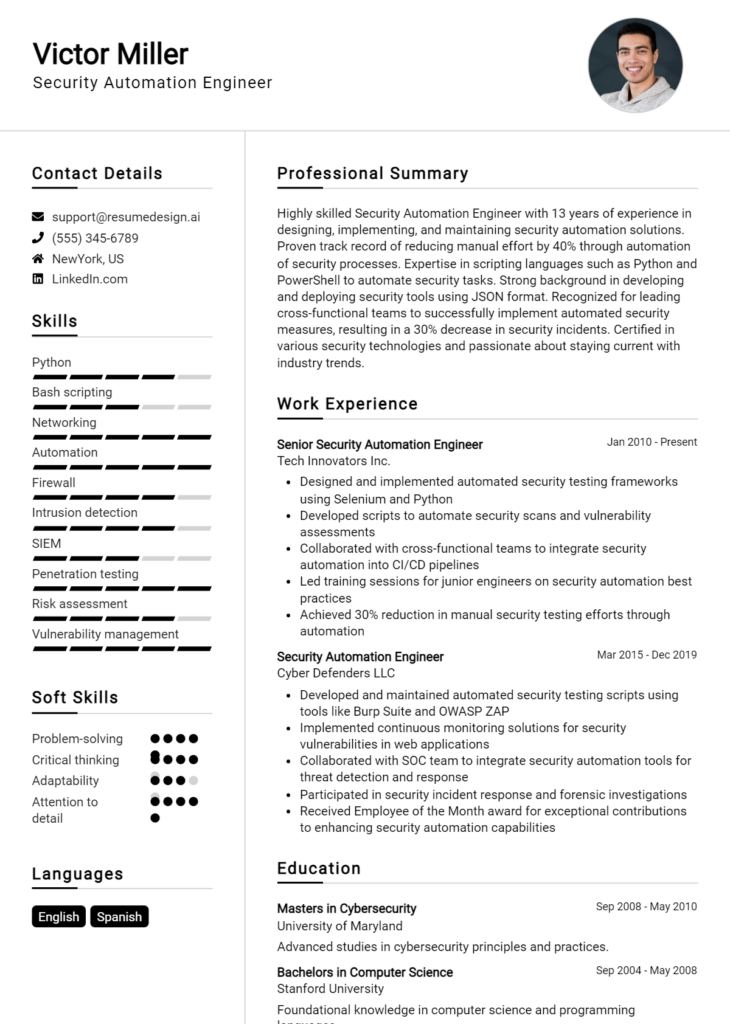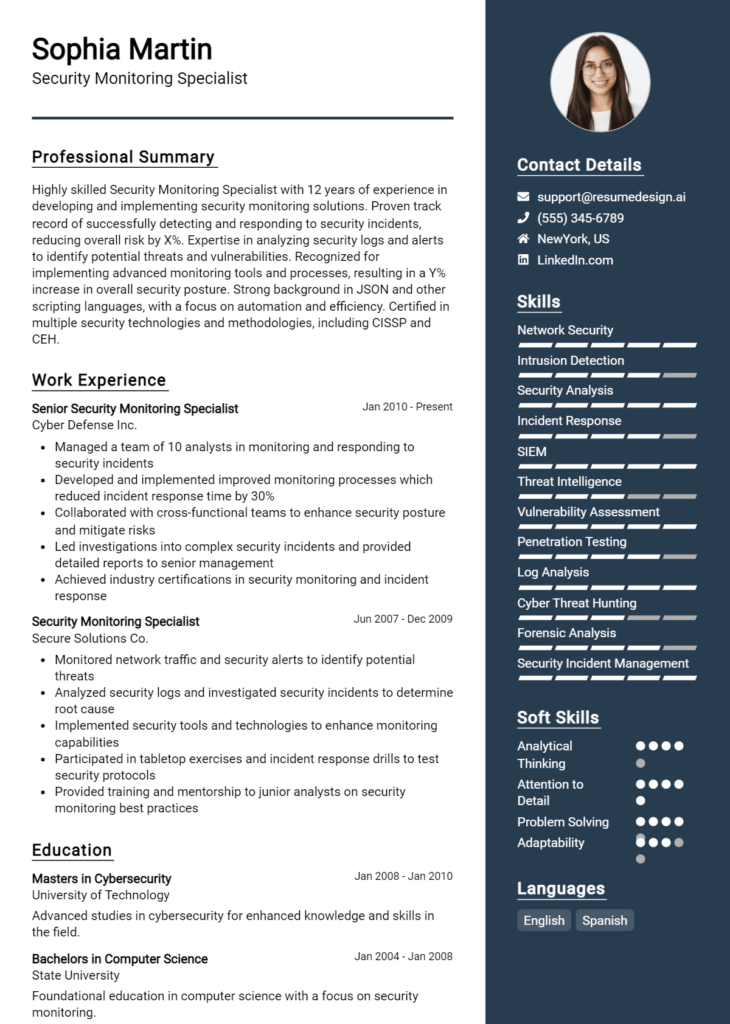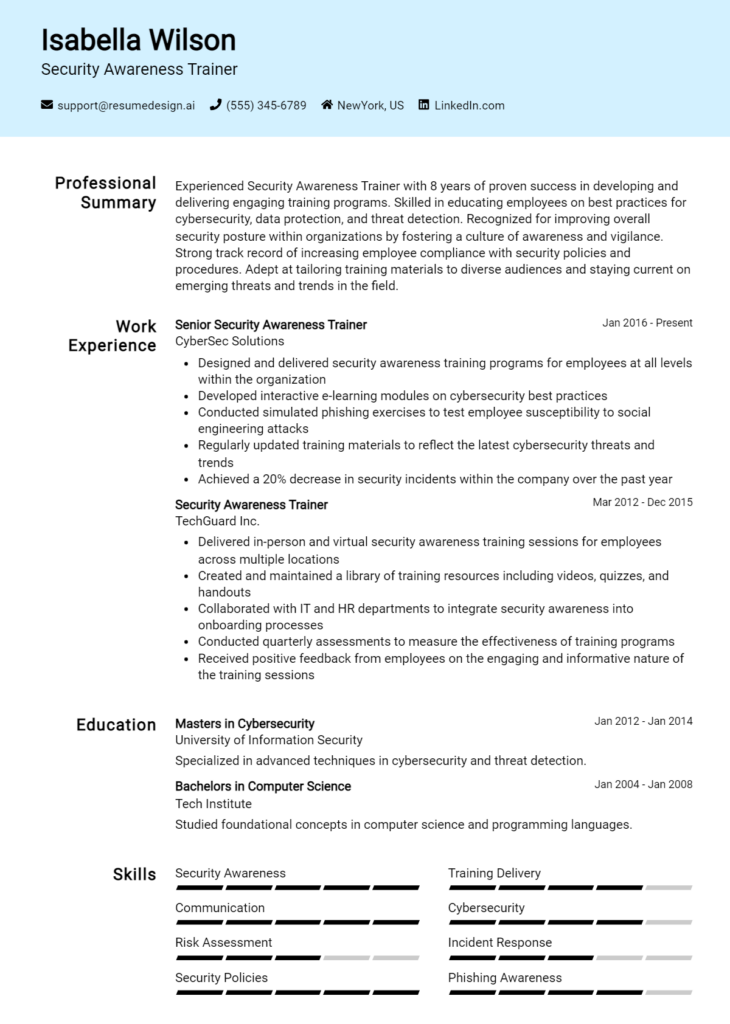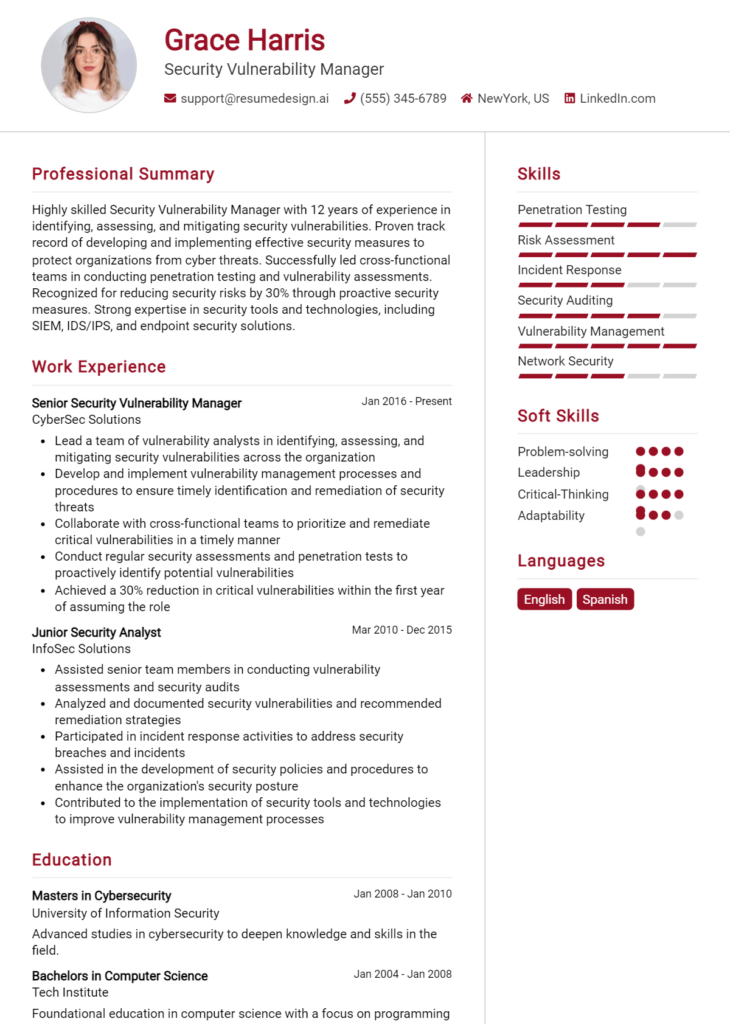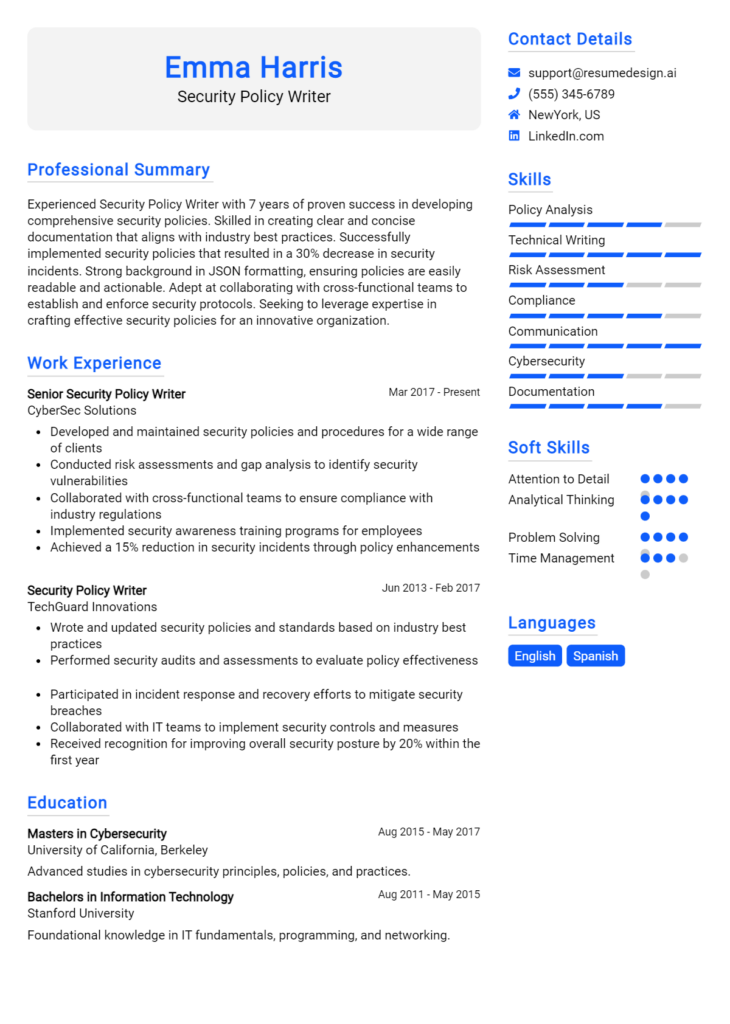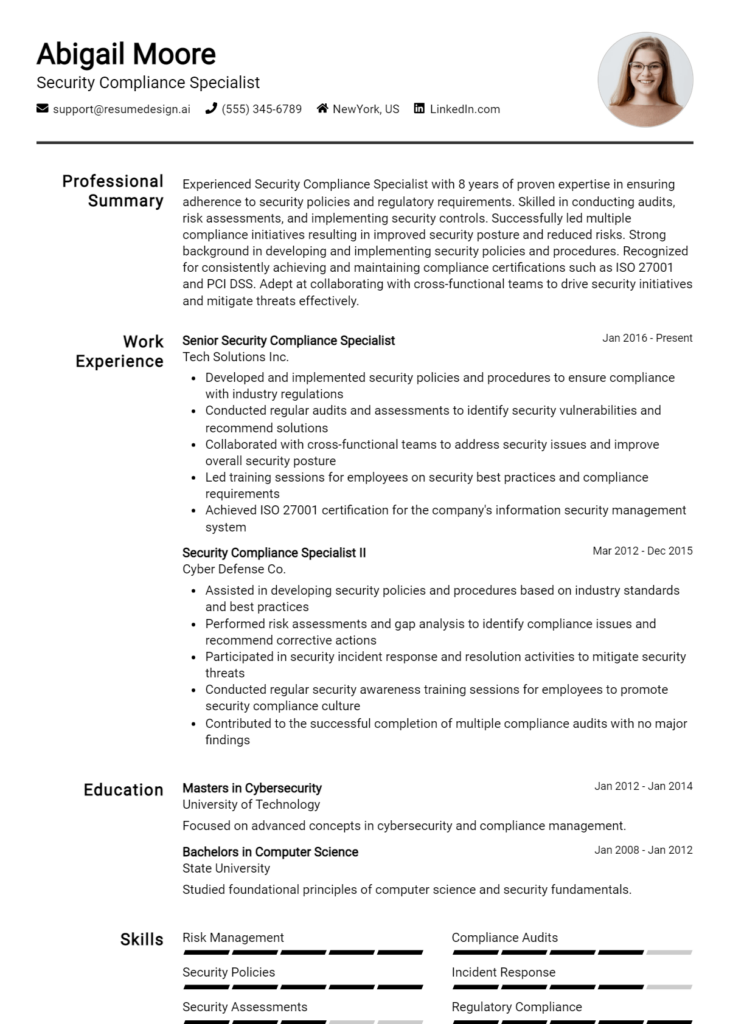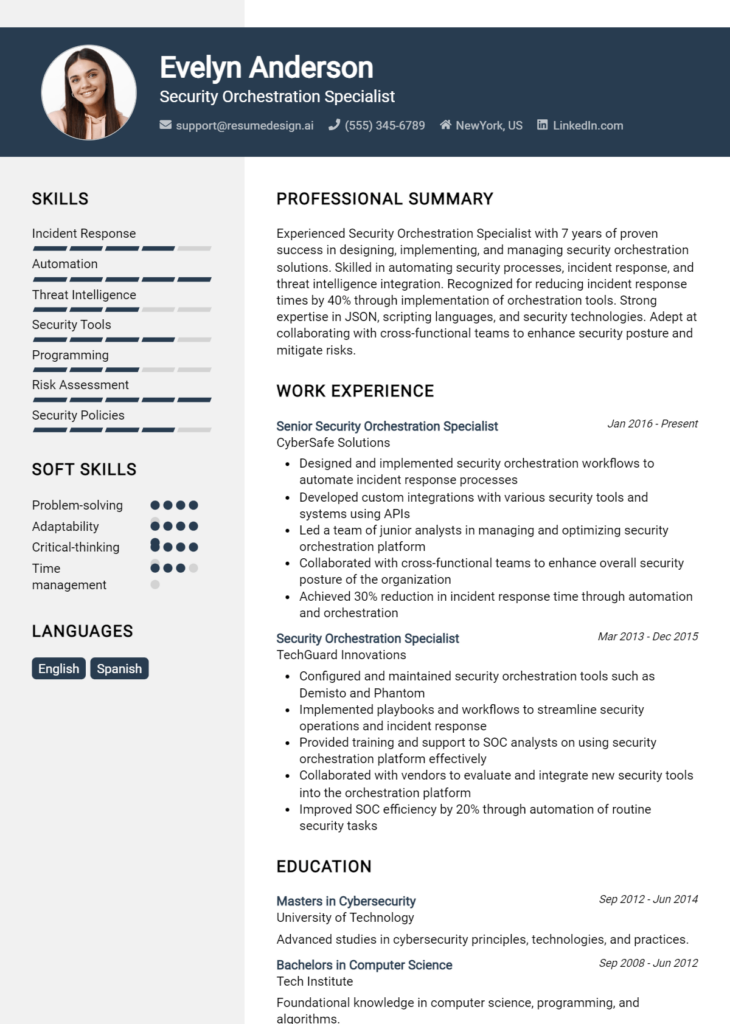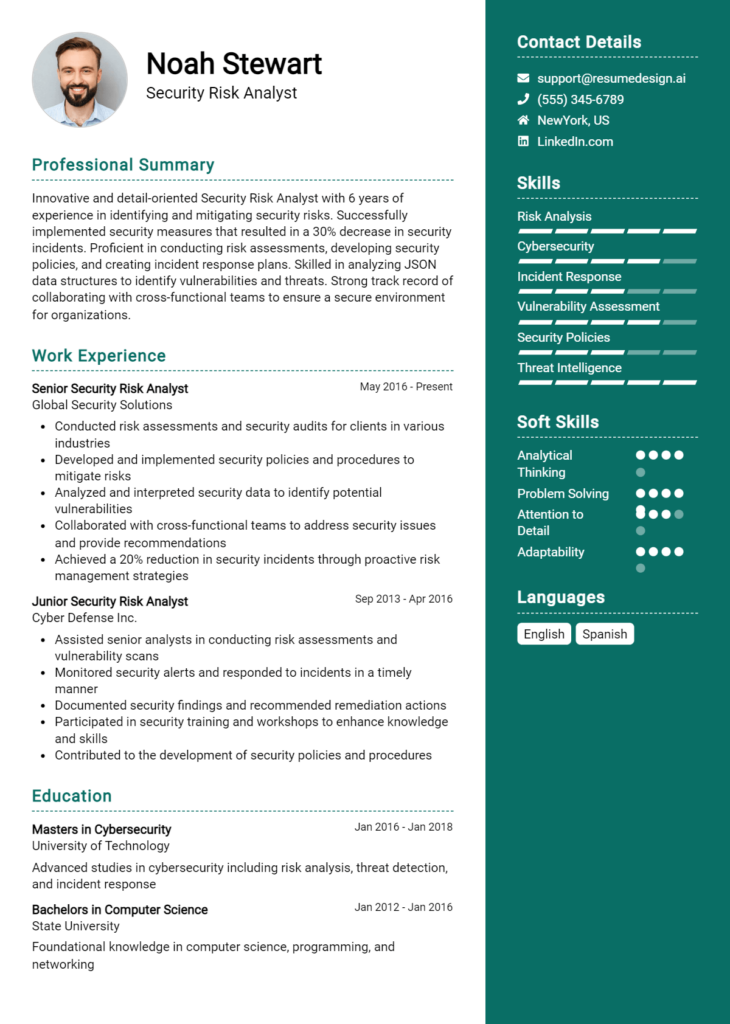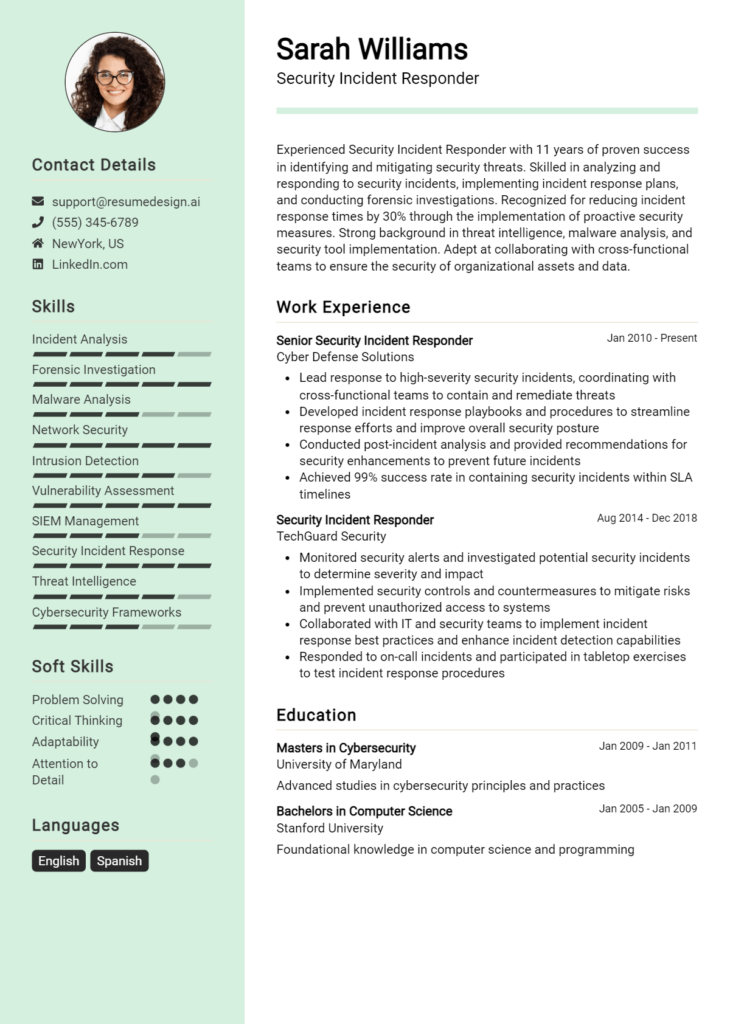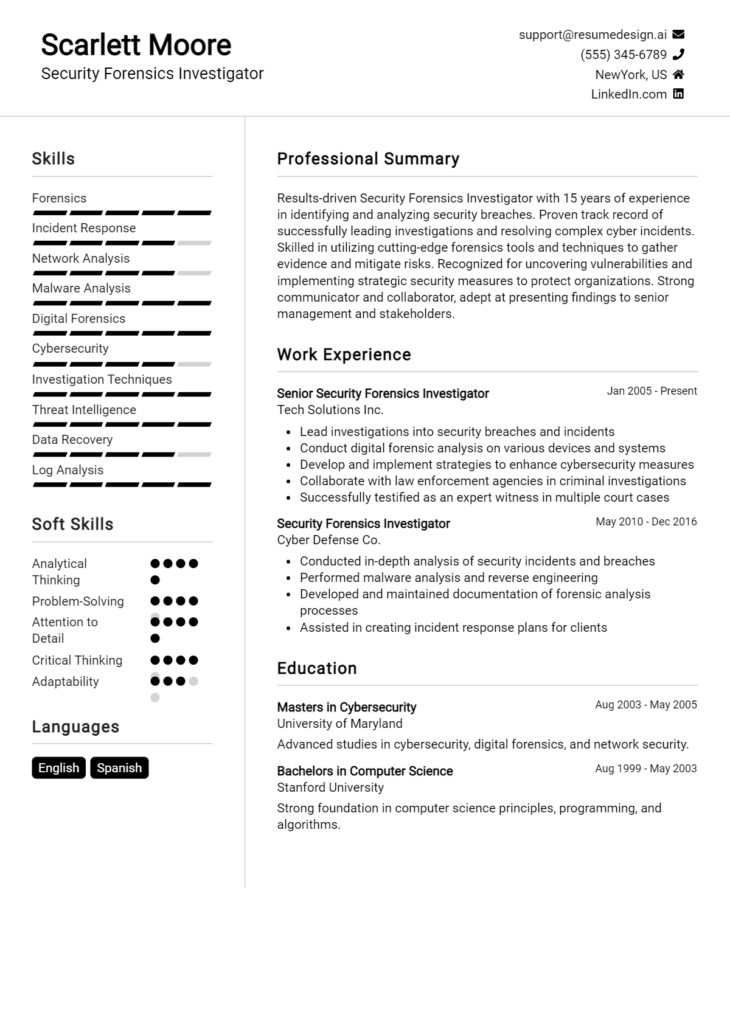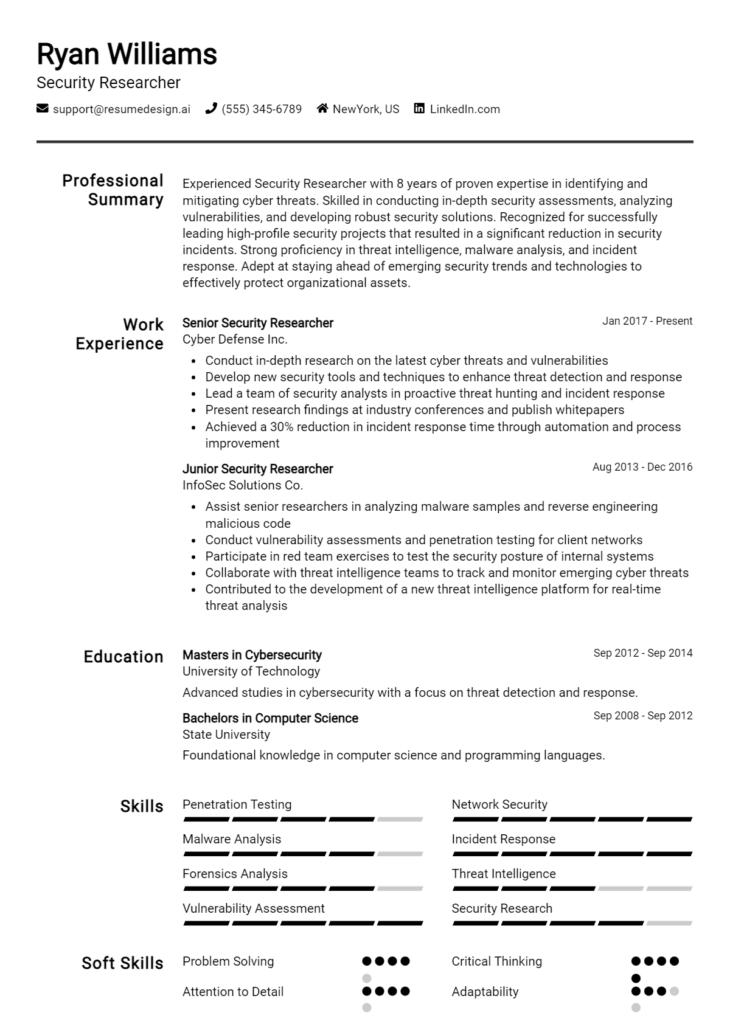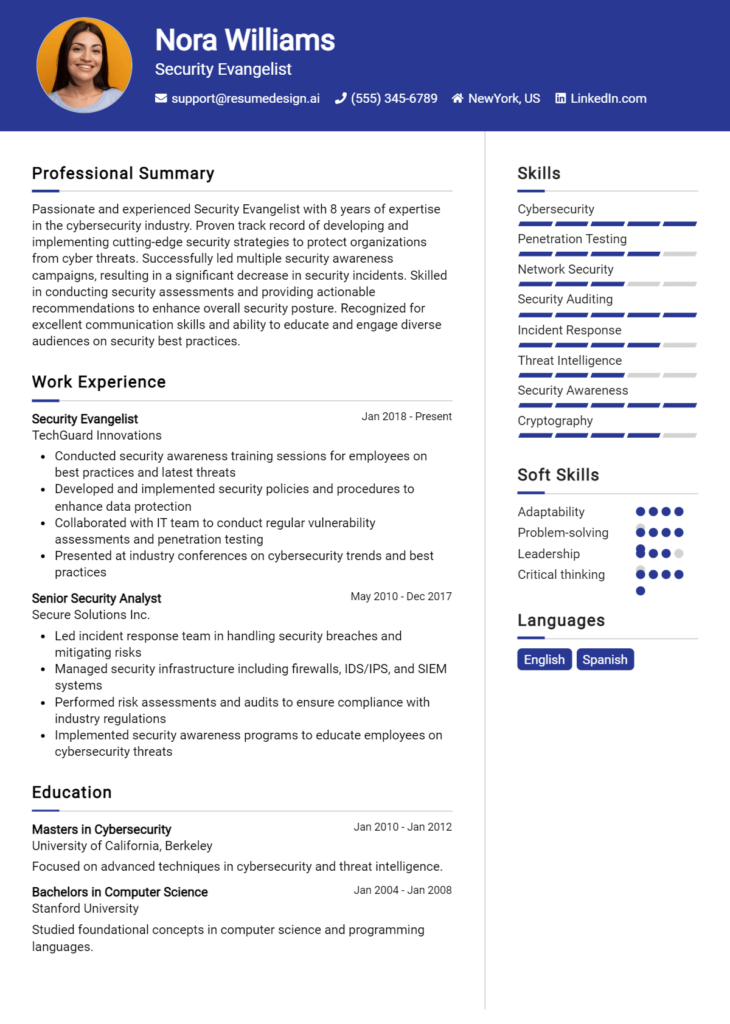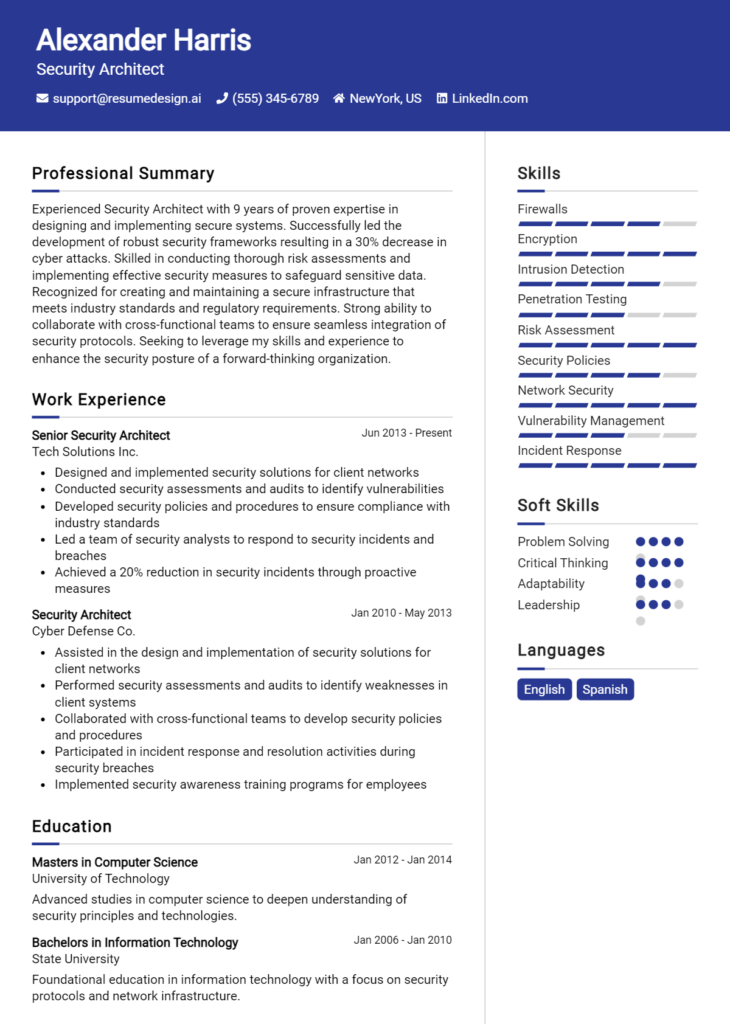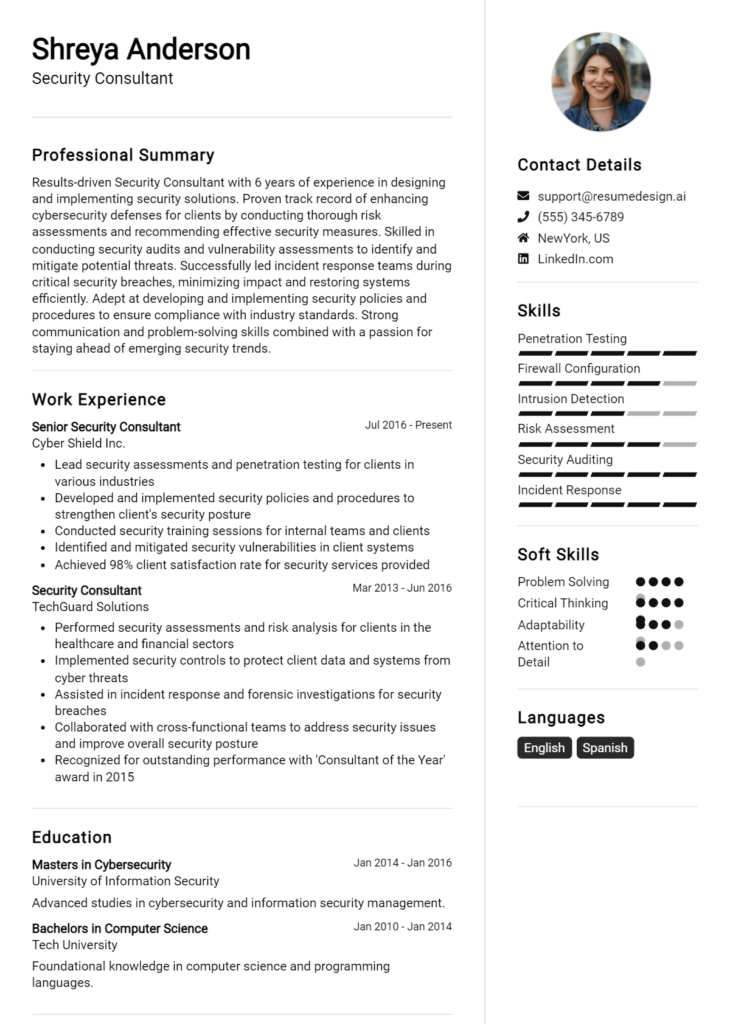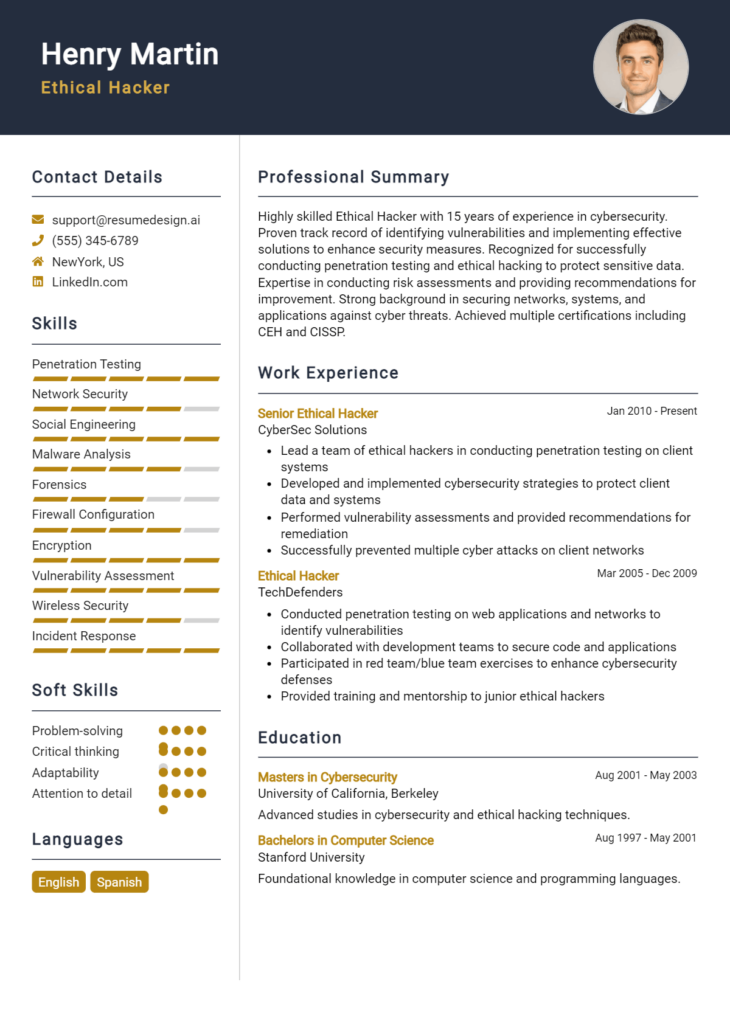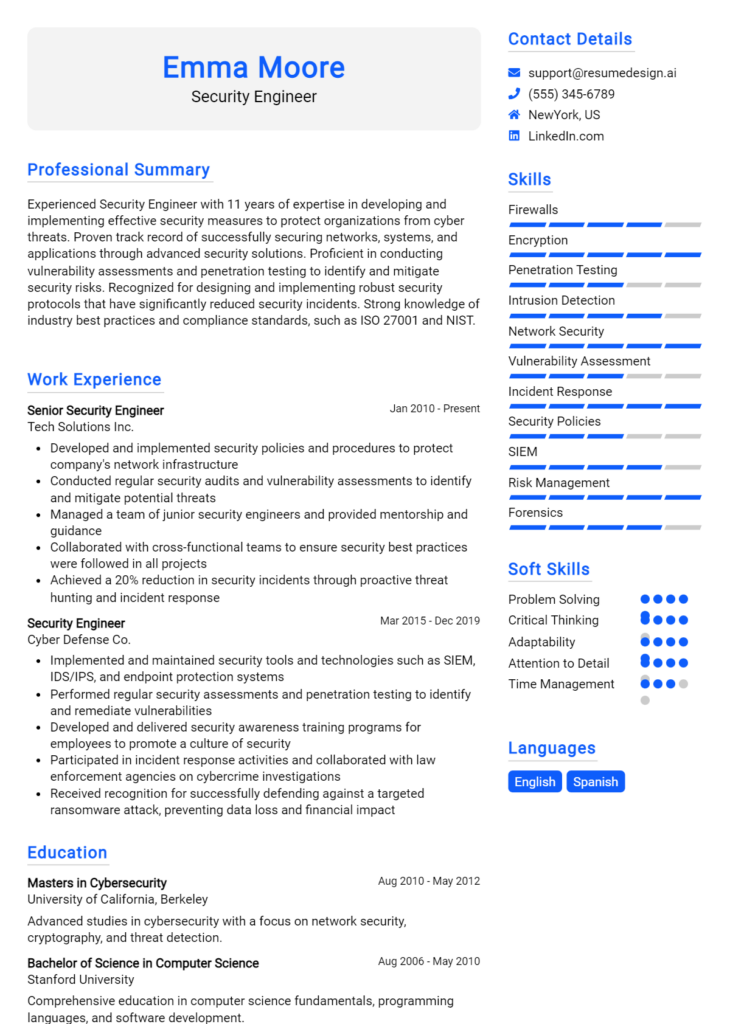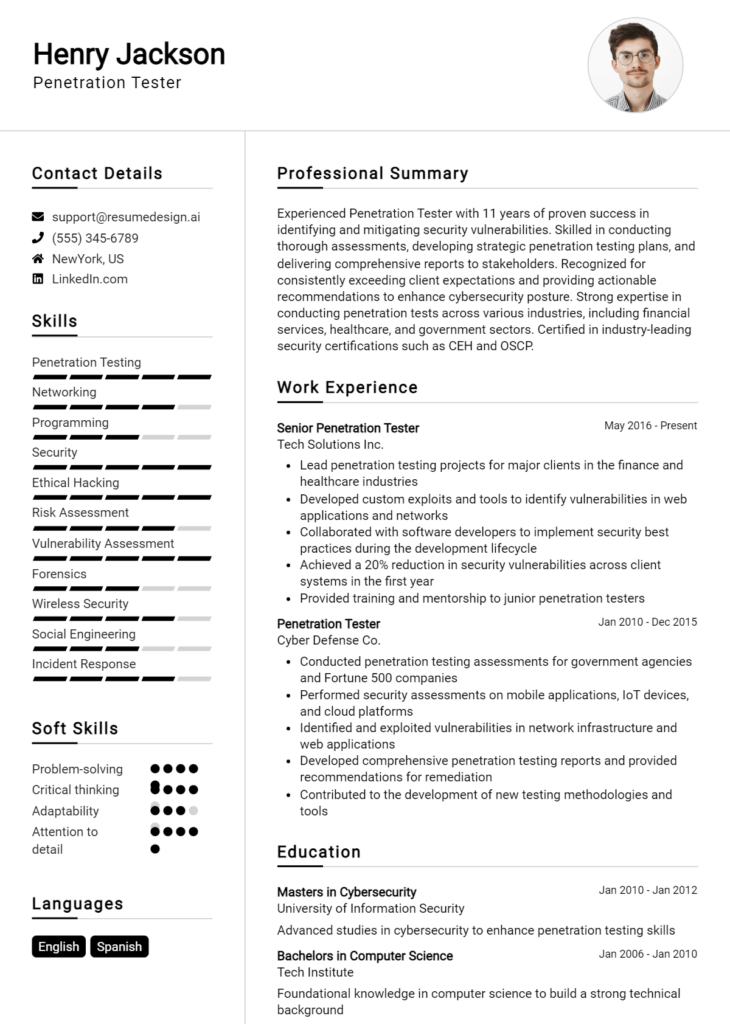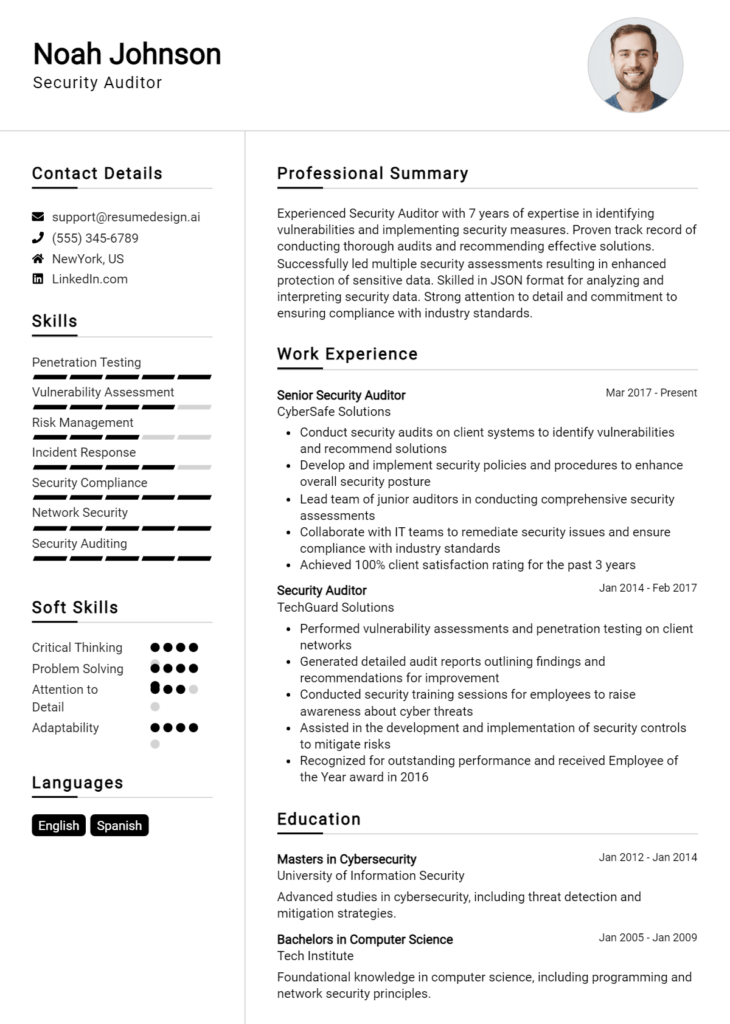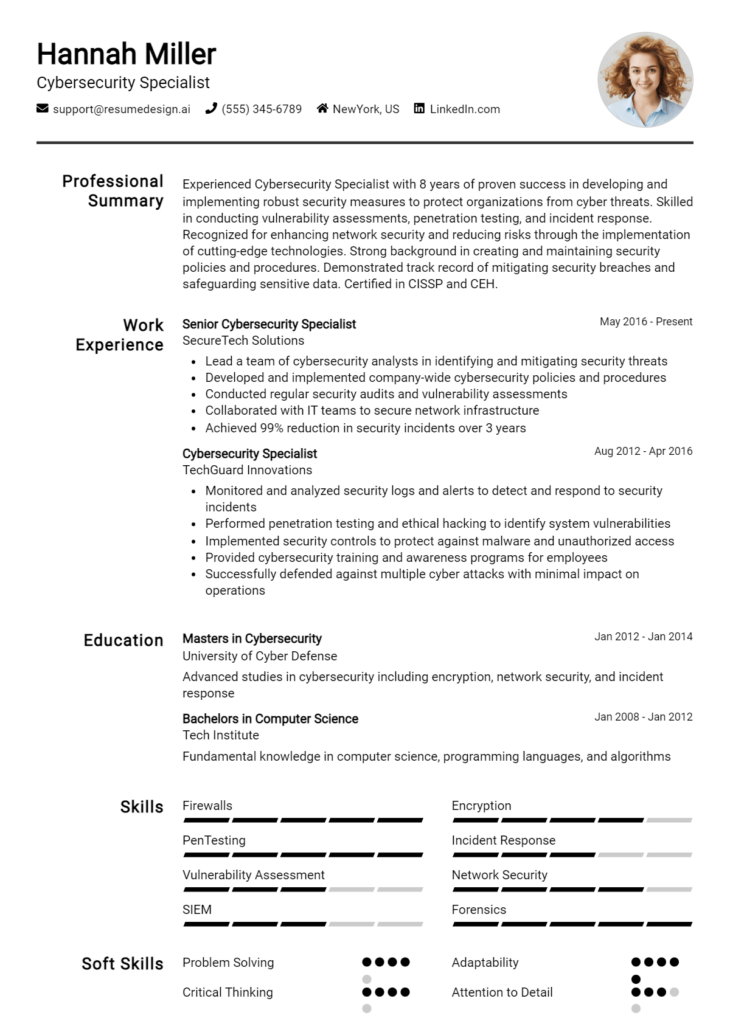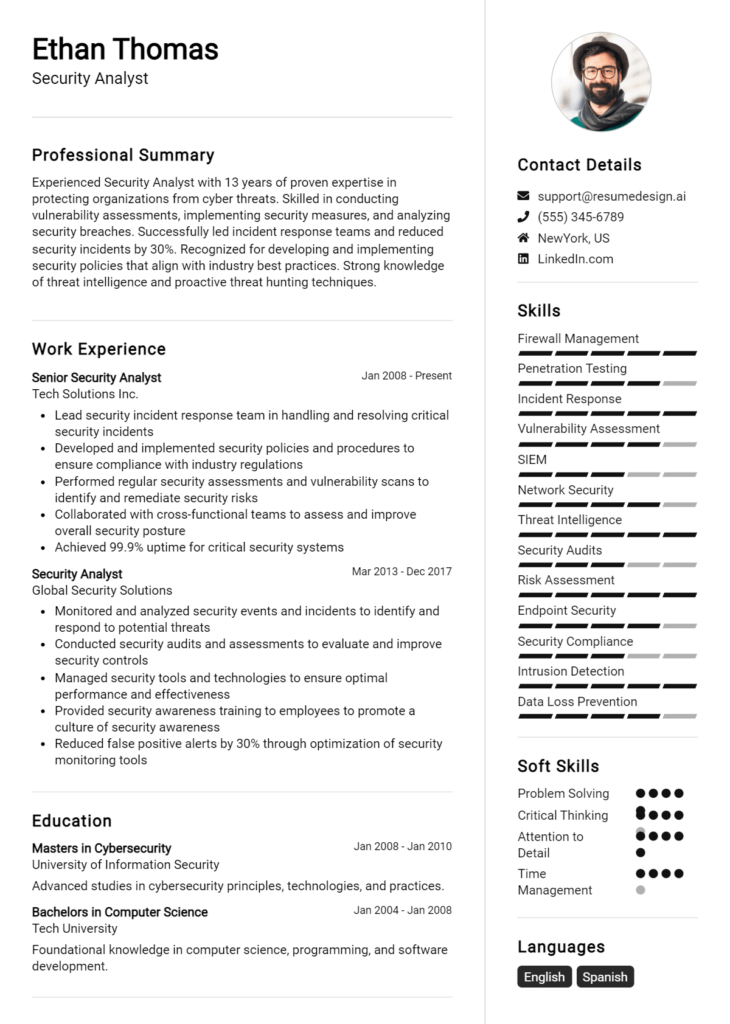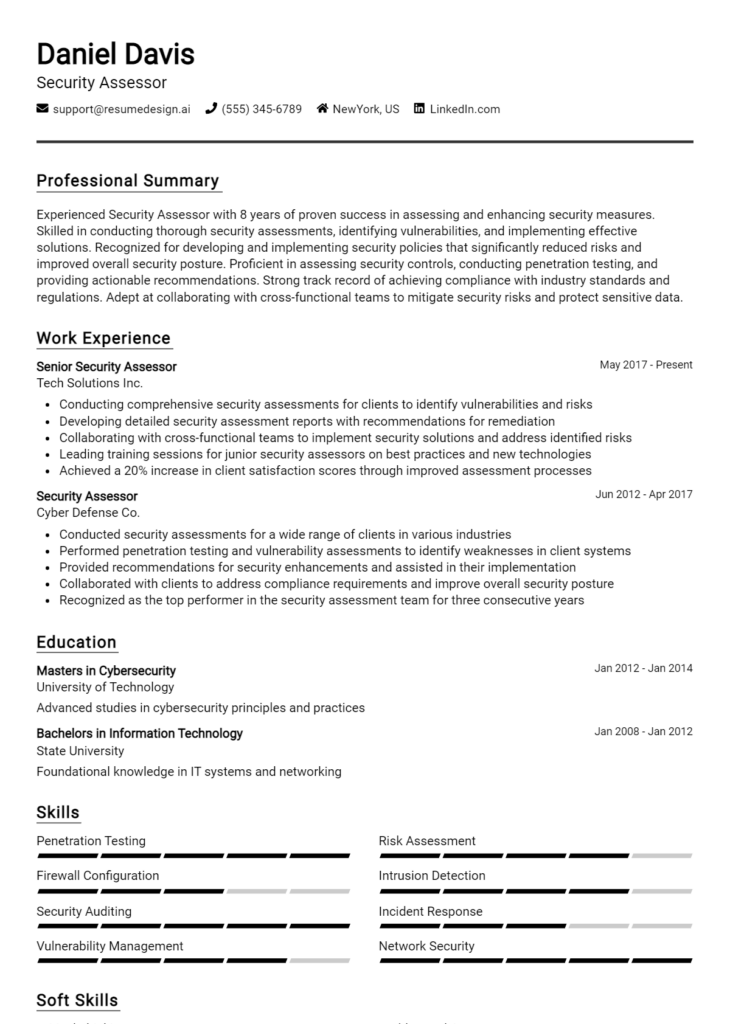Security Malware Analyst Core Responsibilities
A Security Malware Analyst plays a crucial role in protecting an organization from cyber threats by analyzing and mitigating malware risks. This position requires technical expertise in malware analysis, operational efficiency in incident response, and strong problem-solving skills to identify vulnerabilities. Collaborating with IT, security, and compliance teams, the analyst ensures a cohesive defense strategy. A well-structured resume highlighting these competencies can effectively showcase the candidate's value in achieving the organization's cybersecurity goals.
Common Responsibilities Listed on Security Malware Analyst Resume
- Conduct detailed malware analysis to identify and categorize threats.
- Monitor and respond to security incidents and breaches in real-time.
- Develop and implement malware detection and prevention strategies.
- Collaborate with cross-functional teams to enhance security protocols.
- Create and maintain documentation related to malware analysis processes.
- Provide training and guidance on malware prevention techniques.
- Utilize advanced tools for threat intelligence and analysis.
- Stay updated on emerging malware trends and evolving threats.
- Assist in the development of incident response playbooks.
- Participate in security audits and risk assessments.
- Analyze data from security logs to identify patterns of malicious activity.
- Communicate findings and recommendations to stakeholders effectively.
High-Level Resume Tips for Security Malware Analyst Professionals
In the competitive field of cybersecurity, a well-crafted resume is essential for Security Malware Analyst professionals looking to make their mark. Your resume serves as the first impression you make on potential employers, and it needs to effectively communicate not just your skills, but also your achievements and contributions to the field. As the landscape of cybersecurity continues to evolve, having a resume that stands out can mean the difference between landing an interview and getting lost in the pile. This guide will provide practical and actionable resume tips specifically tailored for Security Malware Analyst professionals, helping you to present your qualifications in the best possible light.
Top Resume Tips for Security Malware Analyst Professionals
- Tailor your resume to each job description by incorporating relevant keywords and phrases that reflect the specific requirements of the position.
- Highlight your technical skills, such as familiarity with malware analysis tools, reverse engineering, and threat detection methodologies.
- Showcase your relevant experience, including any internships, certifications, or projects that demonstrate your expertise in malware analysis and cybersecurity.
- Quantify your achievements where possible; use metrics to illustrate your impact, such as the percentage of threats mitigated or incidents resolved.
- Include industry-specific certifications (e.g., CEH, GIAC, or CISSP) that validate your skills and commitment to professional development.
- Demonstrate your problem-solving abilities by providing examples of how you've successfully tackled malware-related challenges in previous roles.
- Utilize a clean, professional format that enhances readability and makes it easy for hiring managers to find pertinent information.
- Incorporate soft skills such as teamwork, communication, and analytical thinking, which are essential for collaborating with other cybersecurity professionals.
- Keep your resume concise and focused, ideally no longer than one page, while ensuring that all information presented is relevant to the role.
By implementing these tips, you can significantly increase your chances of landing a job in the Security Malware Analyst field. A targeted and well-structured resume not only showcases your qualifications but also conveys your dedication and professionalism, making you a compelling candidate for potential employers. With the right approach, your resume can open the door to exciting opportunities in the ever-evolving landscape of cybersecurity.
Why Resume Headlines & Titles are Important for Security Malware Analyst
In the competitive field of cybersecurity, particularly for the role of a Security Malware Analyst, having an impactful resume headline or title is crucial. A well-crafted headline serves as the first impression, quickly grabbing the attention of hiring managers and summarizing a candidate's key qualifications in a concise and powerful manner. A strong headline encapsulates relevant skills, experiences, and accomplishments, ensuring that it resonates with the specific job being applied for. By being concise and directly related to the position, a compelling headline not only enhances the resume’s visibility but also sets the tone for the rest of the application.
Best Practices for Crafting Resume Headlines for Security Malware Analyst
- Keep it concise: Aim for a headline that is no more than 10-12 words.
- Be specific: Use terminology and keywords that relate directly to the Security Malware Analyst role.
- Highlight key skills: Incorporate core competencies that showcase your expertise in malware analysis.
- Include relevant experience: Reference years of experience or notable achievements in the field.
- Showcase certifications: Mention any relevant certifications or specialized training that add value.
- Tailor it to the job: Customize your headline for each application based on the job description.
- Use action-oriented language: Utilize strong action verbs that convey your capabilities effectively.
- Avoid jargon: While specificity is important, ensure the language is accessible and clear.
Example Resume Headlines for Security Malware Analyst
Strong Resume Headlines
"Certified Malware Analyst with 5+ Years of Experience in Threat Detection"
"Expert in Malware Investigation and Endpoint Protection Strategies"
"Dynamic Security Analyst Specializing in Advanced Malware Analysis and Mitigation"
Weak Resume Headlines
“Looking for a Job in Cybersecurity”
“Experienced Professional”
The strong resume headlines are effective because they immediately convey the candidate's qualifications, experience, and specialization in the field of malware analysis. They utilize specific language and keywords that align with the expectations of hiring managers in cybersecurity. In contrast, the weak headlines fail to impress as they are vague and lack specificity, making it difficult for hiring managers to gauge the candidate’s suitability for the role. A generic approach does not highlight any unique skills or experiences, which can lead to missed opportunities in a competitive job market.
Writing an Exceptional Security Malware Analyst Resume Summary
A well-crafted resume summary is crucial for a Security Malware Analyst, as it serves as the first impression to hiring managers who sift through numerous applications. A strong summary quickly captures attention by showcasing key skills, relevant experience, and notable accomplishments that align with the job role. It should be concise and impactful, tailored to the specific position the candidate is applying for, ensuring that it highlights the most pertinent qualifications that set the applicant apart from the competition.
Best Practices for Writing a Security Malware Analyst Resume Summary
- Quantify Achievements: Use specific metrics to demonstrate the impact of your work, such as the percentage of malware threats mitigated.
- Focus on Relevant Skills: Highlight key technical skills such as malware analysis, reverse engineering, and threat detection that are directly applicable to the role.
- Tailor to Job Description: Customize your summary to reflect the keywords and requirements mentioned in the job posting.
- Keep It Concise: Aim for 3-5 sentences that encapsulate your experience and strengths without becoming overly verbose.
- Showcase Industry Knowledge: Mention familiarity with the latest cybersecurity trends, tools, or frameworks that are relevant to the position.
- Highlight Certifications: Include relevant certifications, such as Certified Malware Analyst (CMA) or Certified Information Systems Security Professional (CISSP), to bolster your credibility.
- Use Action-Oriented Language: Start sentences with strong action verbs to convey a sense of proactivity and effectiveness.
- Reflect Professional Growth: Indicate your career trajectory and readiness for the challenges in the new role, showing that you are continually evolving in your field.
Example Security Malware Analyst Resume Summaries
Strong Resume Summaries
Detail-oriented Security Malware Analyst with over 5 years of experience in identifying and neutralizing advanced malware threats. Successfully reduced incident response times by 40% through the implementation of automated analysis tools, contributing to a safer organizational environment.
Results-driven cybersecurity professional with expertise in reverse engineering and behavioral analysis of malware. Recognized for detecting and mitigating over 1,500 unique malware variants, improving overall network security posture by 30% in the last fiscal year.
Dynamic Malware Analyst with a proven track record in threat detection and incident management. Leveraged machine learning algorithms to enhance detection capabilities, resulting in a 25% decrease in false positives and streamlining threat response processes.
Weak Resume Summaries
I am a malware analyst looking for a job in cybersecurity. I have some experience and skills that could be useful.
Dedicated professional with knowledge in malware analysis seeking an opportunity to contribute to a security team. I am eager to learn and grow in the field.
The strong resume summaries are effective because they provide specific achievements, highlight relevant skills, and demonstrate a clear understanding of the role. They quantify results, showcasing the candidate's impact in previous positions. In contrast, the weak summaries are vague and lack measurable outcomes, making them less compelling and failing to capture the hiring manager's interest. They do not provide enough information to illustrate the candidate's qualifications or potential contributions to the organization.
Work Experience Section for Security Malware Analyst Resume
The work experience section of a Security Malware Analyst resume is vital as it highlights the candidate's technical proficiency and practical application of skills in real-world scenarios. This section serves as a platform to showcase the ability to manage teams effectively and deliver high-quality security solutions. By quantifying achievements and aligning experiences with industry standards, candidates can effectively demonstrate their value to potential employers, providing concrete evidence of their capabilities in combating malware threats and enhancing cybersecurity frameworks.
Best Practices for Security Malware Analyst Work Experience
- Highlight relevant technical skills such as reverse engineering, malware analysis, and threat detection.
- Quantify achievements, such as percentage improvements in incident response times or reductions in malware outbreaks.
- Include specific tools and technologies used, such as SIEM systems, antivirus software, or programming languages.
- Showcase collaboration with cross-functional teams, emphasizing communication and teamwork skills.
- Detail leadership roles in projects, demonstrating your ability to guide teams and drive results.
- Align experiences with industry standards and best practices, using relevant terminology and metrics.
- Use action verbs to convey impact and initiative, making your contributions clear and compelling.
- Focus on continuous learning and professional development, such as certifications or training relevant to malware analysis.
Example Work Experiences for Security Malware Analyst
Strong Experiences
- Led a team of 5 analysts in identifying and mitigating a complex malware attack, resulting in a 40% reduction in security incidents over six months.
- Developed and implemented a proactive threat detection system that improved malware identification rates by 30%, significantly enhancing the organization’s security posture.
- Collaborated with software development teams to integrate security best practices, reducing vulnerability exposure by 25% during product lifecycle.
- Conducted in-depth malware analysis on over 1,000 samples, providing actionable intelligence that informed security policy updates and reduced risk.
Weak Experiences
- Worked on malware analysis projects to improve security.
- Participated in team meetings regarding security threats.
- Assisted in identifying malware issues.
- Helped with general cybersecurity tasks as needed.
The examples are considered strong because they provide specific, quantifiable outcomes and demonstrate leadership and collaboration, showcasing the candidate's direct impact on improving security measures. In contrast, the weak examples lack detail and specificity, making it difficult to assess the candidate's contributions or the significance of their roles within the organization.
Education and Certifications Section for Security Malware Analyst Resume
The education and certifications section in a Security Malware Analyst resume is crucial as it serves to showcase the candidate's academic background, relevant industry certifications, and commitment to continuous learning. This section not only demonstrates the foundational knowledge necessary for the role but also highlights specialized training that can set a candidate apart in the competitive cybersecurity landscape. By providing relevant coursework and industry-recognized certifications, candidates enhance their credibility and align more closely with the requirements of the job, ultimately increasing their chances of securing an interview.
Best Practices for Security Malware Analyst Education and Certifications
- Focus on relevant degrees such as Computer Science, Cybersecurity, or Information Technology.
- List industry-recognized certifications like Certified Information Systems Security Professional (CISSP) or Certified Ethical Hacker (CEH).
- Include specialized training programs or workshops related to malware analysis and threat detection.
- Provide detailed coursework that directly aligns with the skills required for a Security Malware Analyst role.
- Highlight any ongoing education, such as online courses or webinars, to show commitment to staying updated in the field.
- Use clear formatting to make the section easy to read and visually appealing.
- Prioritize recent certifications and education to demonstrate current knowledge and skills.
- Avoid listing irrelevant degrees or certifications that do not pertain to the cybersecurity field.
Example Education and Certifications for Security Malware Analyst
Strong Examples
- Bachelor’s Degree in Cybersecurity, University of XYZ, 2022
- Certified Malware Analyst (CMA), Cybersecurity Institute, 2023
- Coursework in Malware Analysis and Incident Response, Online Learning Platform, 2022
- GIAC Certified Forensic Analyst (GCFA), Global Information Assurance Certification, 2023
Weak Examples
- Bachelor’s Degree in English Literature, University of ABC, 2018
- Certification in Microsoft Office Applications, Tech Training Center, 2020
- High School Diploma, Local High School, 2016
- Outdated CompTIA Security+ Certification, 2015
The strong examples listed are considered effective because they demonstrate relevant degrees and certifications that directly pertain to the field of cybersecurity and malware analysis, showcasing the candidate's knowledge and skills. In contrast, the weak examples reflect qualifications that are either outdated, irrelevant, or do not contribute to the candidate's ability to perform as a Security Malware Analyst, which could undermine their application and diminish their appeal to potential employers.
Top Skills & Keywords for Security Malware Analyst Resume
A well-crafted resume for a Security Malware Analyst is essential not only for showcasing technical expertise but also for highlighting the soft skills that enable effective communication and problem-solving in a high-stakes environment. Employers seek candidates who not only understand the complexities of malware analysis but also possess the ability to work collaboratively within a team, convey technical information to non-technical stakeholders, and adapt to rapidly changing cyber threats. By integrating a balanced mix of both hard and soft skills, applicants can create a compelling resume that stands out in a competitive job market.
Top Hard & Soft Skills for Security Malware Analyst
Soft Skills
- Critical thinking
- Attention to detail
- Problem-solving
- Communication
- Team collaboration
- Adaptability
- Time management
- Analytical mindset
- Research skills
- Decision-making
Hard Skills
- Malware reverse engineering
- Network security protocols
- Threat analysis and assessment
- Programming languages (Python, C++, Java)
- Digital forensics
- Security information and event management (SIEM) tools
- Operating systems (Windows, Linux, macOS)
- Vulnerability scanning and assessment
- Incident response
- Data analysis and reporting
By focusing on these skills, Security Malware Analysts can enhance their resumes and better demonstrate their qualifications. Additionally, showcasing relevant work experience that aligns with these skills can further solidify an applicant's candidacy in the cybersecurity field.
Stand Out with a Winning Security Malware Analyst Cover Letter
Dear [Hiring Manager's Name],
I am excited to apply for the Security Malware Analyst position at [Company Name] as advertised on [Where You Found the Job Posting]. With a strong background in cybersecurity and a passion for identifying and mitigating malware threats, I believe I am well-equipped to contribute to your team and enhance your organization's defenses against evolving cyber threats. My experience in analyzing security incidents, conducting forensic investigations, and developing proactive strategies aligns perfectly with the requirements of this role.
In my previous position at [Previous Company Name], I successfully identified and neutralized several sophisticated malware attacks, which resulted in a 30% decrease in security breaches over the course of a year. My hands-on experience with malware analysis tools such as IDA Pro, Wireshark, and VirusTotal has enabled me to dissect malicious code and understand its behavior in different environments. Additionally, I have collaborated with cross-functional teams to develop comprehensive threat intelligence reports that informed our security policies and procedures, ultimately strengthening our overall security posture.
I am particularly drawn to [Company Name] because of your commitment to innovation and excellence in cybersecurity. I admire your proactive approach to threat detection and incident response, and I am eager to leverage my skills in malware analysis to contribute to your ongoing efforts. I am confident that my analytical mindset and attention to detail will enable me to effectively identify emerging threats and enhance your malware response strategies.
Thank you for considering my application. I look forward to the opportunity to discuss how my expertise in malware analysis can add value to your team. I am excited about the possibility of working at [Company Name] and contributing to a safer digital environment.
Sincerely,
[Your Name]
[Your LinkedIn Profile]
[Your Contact Information]
Common Mistakes to Avoid in a Security Malware Analyst Resume
In the competitive field of cybersecurity, a well-crafted resume is essential for a Security Malware Analyst position. However, many candidates make common mistakes that can undermine their chances of landing an interview. By avoiding these pitfalls, applicants can effectively highlight their skills and experience, ensuring that their resume stands out to potential employers in this critical domain.
Vague Job Descriptions: Failing to provide specific details about previous roles can leave hiring managers unsure about your actual responsibilities and achievements. Clearly outline your duties, technologies used, and the impact of your work.
Ignoring Relevant Certifications: Not mentioning certifications such as Certified Ethical Hacker (CEH) or Offensive Security Certified Professional (OSCP) can be a missed opportunity. These credentials demonstrate your commitment and expertise in the cybersecurity field.
Overcomplicating Technical Language: Using too much jargon or overly complex terminology can alienate readers. Use clear and concise language to describe your skills and experiences, making them accessible to HR personnel who may not have a technical background.
Lack of Quantifiable Achievements: Simply listing tasks performed without quantifying results fails to showcase your effectiveness. Include metrics or outcomes that demonstrate how your work contributed to reducing threats or improving security protocols.
Neglecting Soft Skills: Focusing solely on technical skills while ignoring soft skills such as communication and teamwork can be detrimental. Security analysts often collaborate with various teams; highlighting your interpersonal skills can set you apart.
Generic Objective Statements: Using a one-size-fits-all objective statement can make your resume seem impersonal. Tailor your objective to reflect your specific interest in the position and how your skills align with the company's goals.
Inconsistent Formatting: A poorly formatted resume can be distracting and unprofessional. Ensure consistency in font, bullet points, and layout to create a polished and easy-to-read document.
Not Tailoring for Each Job Application: Sending the same resume to multiple employers without customization can dilute your chances. Tailor your resume for each application, emphasizing the skills and experiences most relevant to the specific role.
Conclusion
As we explored the critical role of a Security Malware Analyst, we highlighted several key responsibilities, such as identifying, analyzing, and mitigating malware threats, as well as staying updated with the evolving landscape of cyber threats. We also discussed the importance of technical skills, including familiarity with various security tools, programming languages, and the ability to conduct forensic analysis. Moreover, the significance of effective communication and collaboration with other security professionals cannot be overstated, as it is essential for developing comprehensive security strategies.
In conclusion, if you're looking to advance your career as a Security Malware Analyst, it’s crucial to ensure your resume accurately reflects your skills and experiences. We encourage you to take a moment to review your resume and consider using helpful resources available online. Explore our resume templates for a polished look, utilize the resume builder for a user-friendly experience, and check out our resume examples for inspiration. Don't forget about the importance of a strong cover letter; you can find effective cover letter templates to help you stand out. Take action today to enhance your professional profile and increase your chances of landing your desired role in the cybersecurity field!

